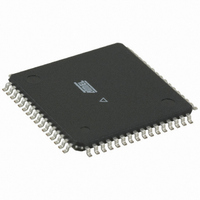ATMEGA256RZAV-8AU Atmel, ATMEGA256RZAV-8AU Datasheet - Page 256

ATMEGA256RZAV-8AU
Manufacturer Part Number
ATMEGA256RZAV-8AU
Description
MCU ATMEGA2561/AT86RF230 64-TQFP
Manufacturer
Atmel
Series
ATMEGAr
Datasheets
1.ATMEGA640V-8CU.pdf
(38 pages)
2.ATMEGA640V-8CU.pdf
(444 pages)
3.AT86RF230-ZU.pdf
(98 pages)
Specifications of ATMEGA256RZAV-8AU
Frequency
2.4GHz
Modulation Or Protocol
802.15.4 Zigbee
Applications
ISM, ZigBee™
Power - Output
3dBm
Sensitivity
-101dBm
Voltage - Supply
1.8 V ~ 3.6 V
Current - Receiving
15.5mA
Current - Transmitting
16.5mA
Data Interface
PCB, Surface Mount
Memory Size
256kB Flash, 4kB EEPROM, 8kB RAM
Antenna Connector
PCB, Surface Mount
Package / Case
64-TQFP
Wireless Frequency
2.4 GHz
Interface Type
JTAG, SPI
Output Power
3 dBm
For Use With
ATAVRISP2 - PROGRAMMER AVR IN SYSTEM
Lead Free Status / RoHS Status
Lead free / RoHS Compliant
Operating Temperature
-
Data Rate - Maximum
-
Lead Free Status / Rohs Status
Lead free / RoHS Compliant
For Use With/related Products
ATmega256
- Current page: 256 of 444
- Download datasheet (10Mb)
2549M–AVR–09/10
Figure 23-13. Data Transfer in Master Receiver Mode
A START condition is sent by writing the following value to TWCR:
TWEN must be written to one to enable the 2-wire Serial Interface, TWSTA must be written to
one to transmit a START condition and TWINT must be set to clear the TWINT Flag. The TWI
will then test the 2-wire Serial Bus and generate a START condition as soon as the bus
becomes free. After a START condition has been transmitted, the TWINT Flag is set by hard-
ware, and the status code in TWSR will be 0x08 (see
MR mode, SLA+R must be transmitted. This is done by writing SLA+R to TWDR. Thereafter the
TWINT bit should be cleared (by writing it to one) to continue the transfer. This is accomplished
by writing the following value to TWCR:
When SLA+R have been transmitted and an acknowledgement bit has been received, TWINT is
set again and a number of status codes in TWSR are possible. Possible status codes in Master
mode are 0x38, 0x40, or 0x48. The appropriate action to be taken for each of these status codes
is detailed in
when the TWINT Flag is set high by hardware. This scheme is repeated until the last byte has
been received. After the last byte has been received, the MR should inform the ST by sending a
NACK after the last received data byte. The transfer is ended by generating a STOP condition or
a repeated START condition. A STOP condition is generated by writing the following value to
TWCR:
A REPEATED START condition is generated by writing the following value to TWCR:
After a repeated START condition (state 0x10) the 2-wire Serial Interface can access the same
Slave again, or a new Slave without transmitting a STOP condition. Repeated START enables
the Master to switch between Slaves, Master Transmitter mode and Master Receiver mode with-
out losing control over the bus.
TWCR
value
TWCR
value
TWCR
value
TWCR
value
SDA
SCL
Table 23-3 on page
TWINT
TWINT
TWINT
TWINT
1
1
1
1
Device 1
RECEIVER
MASTER
TWEA
TWEA
TWEA
TWEA
X
X
X
X
TRANSMITTER
Device 2
ATmega640/1280/1281/2560/2561
SLAVE
TWSTA
TWSTA
TWSTA
TWSTA
257. Received data can be read from the TWDR Register
1
0
0
1
Device 3
TWSTO
TWSTO
TWSTO
TWSTO
0
0
1
0
........
Table 23-2 on page
TWWC
TWWC
TWWC
TWWC
Device n
X
X
X
X
V
CC
TWEN
TWEN
TWEN
TWEN
1
1
1
1
R1
254). In order to enter
R2
–
0
–
0
–
0
–
0
TWIE
TWIE
TWIE
TWIE
X
X
X
X
256
Related parts for ATMEGA256RZAV-8AU
Image
Part Number
Description
Manufacturer
Datasheet
Request
R

Part Number:
Description:
DEV KIT FOR AVR/AVR32
Manufacturer:
Atmel
Datasheet:

Part Number:
Description:
INTERVAL AND WIPE/WASH WIPER CONTROL IC WITH DELAY
Manufacturer:
ATMEL Corporation
Datasheet:

Part Number:
Description:
Low-Voltage Voice-Switched IC for Hands-Free Operation
Manufacturer:
ATMEL Corporation
Datasheet:

Part Number:
Description:
MONOLITHIC INTEGRATED FEATUREPHONE CIRCUIT
Manufacturer:
ATMEL Corporation
Datasheet:

Part Number:
Description:
AM-FM Receiver IC U4255BM-M
Manufacturer:
ATMEL Corporation
Datasheet:

Part Number:
Description:
Monolithic Integrated Feature Phone Circuit
Manufacturer:
ATMEL Corporation
Datasheet:

Part Number:
Description:
Multistandard Video-IF and Quasi Parallel Sound Processing
Manufacturer:
ATMEL Corporation
Datasheet:

Part Number:
Description:
High-performance EE PLD
Manufacturer:
ATMEL Corporation
Datasheet:

Part Number:
Description:
8-bit Flash Microcontroller
Manufacturer:
ATMEL Corporation
Datasheet:

Part Number:
Description:
2-Wire Serial EEPROM
Manufacturer:
ATMEL Corporation
Datasheet:










